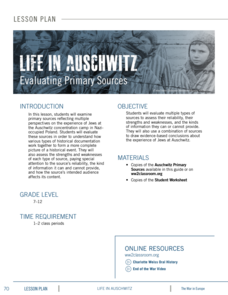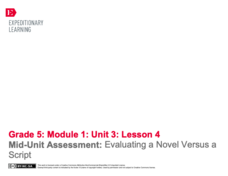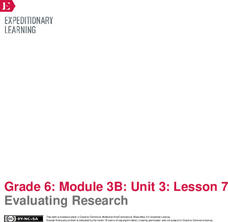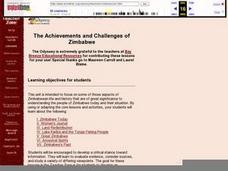National WWII Museum
Life in Auschwitz: Evaluating Primary Sources
Historians explain what happened during the Holocaust, but only primary sources portray the true horror of places such as Auschwitz. Using accounts from those who survived the camps, as well as a Nazi government official's memoirs, class...
EngageNY
Mid-Unit Assessment: Evaluating a Novel Versus a Script
How are novels and scripts alike and different? As part of the mid-unit assessment, scholars complete a Venn diagram to compare two types of writing: a novel and a script. Next, they respond to short-answer questions, evaluating passages...
Media Smarts
Bias in News Sources
As young consumers of media, it is important for high schoolers to explore concepts of bias and prejudice, and how they may be present in media. After discussing ideological messages that media can contain, individuals complete a warm-up...
Curated OER
Save the Music Concerts: Parts 1 & 2
Music aficionados classify pop music into by musical genres or styles. They evaluate the positive and negatives of collaborative performances, view segments of VH1's "Save the Music" concert, and discuss the difficulties of categorizing...
EngageNY
End of Unit Assessment: Tracing and Evaluating Arguments
Give water the attention it deserves. Scholars watch Corporations Need to Pay More Attention to Water and respond to questions as part of their end of the unit assessment. They then complete the assessment by reading and responding to...
Southern Poverty Law Center
Evaluating Reliable Sources
A lesson plan instills the importance of locating reliable sources. Scholars are challenged to locate digital sources, analyze their reliability, search for any bias, and identify frequently found problems that make a source unusable.
EngageNY
Grade 9 ELA Module 4, Unit 1, Lesson 19
Building on the previous discussion of the supplemental reading article "Where Sweatshops Are a Dream," class members use the provided Evaluating Argument and Evidence Tool to identify the claims and evidence Nicholas Kristof uses to...
Newseum
Evidence: Do the Facts Hold Up?
Sometimes it's hard to escape bad information! Pupils learn the E.S.C.A.P.E. method for evaluating news sources and complete a worksheet to assess a news article using their new skills.
Newseum
Putting the Consumer's Questions to Work
Who, what, when, where, why, and how are good questions to ask when evaluating a source. First, scholars find two sources of information relating to a chosen topic. Next, pupils complete a worksheet to gauge the source's credibility....
C-SPAN
Evaluating Historical Presidential Campaign Ads
Political ads flood the airwaves each election cycle. An activity including more than a dozen political ads from iconic presidential campaigns helps learners unpack how the sausage gets made during election "silly season." Using the...
EngageNY
Paraphrasing and Evaluating Sources: “Gaming Can Make a Better World”
Explore how gaming might make the world a better place. To dissect the statement, scholars watch video clips about the benefits of video games. While listening, pupils make notes in their researcher's notebooks, attempting to discern the...
National Endowment for the Humanities
The Gulf of Tonkin Resolution and Escalation of the Vietnam War
The Gulf of Tonkin Resolution propelled America's involvement into a bloody conflict—and it was based on a fallacy. Using the resolution and other documents from the Vietnam War, including declassified documents, young historians...
National WWII Museum
The War in Europe: Evaluating Historic Decisions
War brings a whole new set of ethical dilemmas. From deciding whether to enlist in a segregated and racist Army to whether to sacrifice civilian lives to prepare for a critical D-Day invasion, leaders during World War II faced many...
EngageNY
Writing an Argument Essay: Evaluating the Model and Crafting a Claim (Chapter 28, Including Synthesis of Scenes in Previous Chapters)
Scholars use the model essay from the previous instructional activity to create their own argumentative essays. Readers make a claim about Atticus defending Tom in To Kill A Mockingbird. They then use graphic organizers to develop and...
EngageNY
Mid-Unit Assessment: Classifying and Evaluating Primary Sources
Let's go for a walk. Learners complete the mid-unit assessment by completing a gallery walk to analyze different primary sources discussed while reading A Mighty Long Way. After viewing the sources, class members complete organizers and...
EngageNY
Evaluating Sources, Continued: The ONLINE EDUCA Debate 2009 (Part 2 of 10)
Watching videos and playing online games can be educational, but too much screen time has its drawbacks. Pupils watch a video about the topic and write down the claim, reasons, and evidence in support of reduced screen time for children....
EngageNY
Paraphrasing and Evaluating Sources: Pages 112–116 of The Big Thirst
Agriculture and water—it's a fine balance. So how exactly do industry and agriculture currently manage water? Pupils consider the question as they continue reading excerpts from Charles Fishman's The Big Thirst and adding notes to their...
News Literacy Project
Story Explorers: Evaluate News Coverage
What makes an issue or event newsworthy? Scholars complete a K-W-H-L chart based on a recent news event. As they complete the chart, small groups collaborate to analyze coverage of the story or event.
EngageNY
Evaluating Research
Calling all archaeologists! Scholars dig through their research about overfishing, searching for the best information to include in their consumer guides. Next, pupils engage in a pair-share activity to discuss their findings with a...
Curated OER
The Achievements and Challenges of Zimbabwe
Here is an excellent set of five short lessons and activities intended to help learners not only gain an understand of current issues in Africa, but build critical thinking, synthesis, analysis, expository writing, research, and...
Curated OER
A Critical Look at Aboriginal Art
Students observe art from different Aboriginal cultures. In this art evaluation lesson, students discover the different traditions of cultures from the Pacific North West. Students judge the art from these cultures with a specific...
iCivics
NewsFeed Defenders Extension Pack
Accuracy, transparency, trustworthiness, and impartiality are four unspoken rules of journalism. Scholars delve deep into the subject by discussing the pros and cons of relying on social media for news. They also play an online game to...
Newseum
E.S.C.A.P.E. Junk News
Fair, balanced, and reputable information? There's an acronym for that! Scholars learn the E.S.C.A.P.E. method for evaluating news sources. Then, pupils work in small groups to read and analyze a news story and discuss the activity to...
NPR
Test and Evaluate the Prototype
Time to test the prototype. Groups test their prototypes to the plastics problem under consideration. The results of the tests and peer feedback offer a means to refine the prototype.
Other popular searches
- Evaluate Expressions
- Evaluate Writing Technique
- And Evaluate
- Evaluate Balance of Power
- Evaluate Information
- Evaluate Algebraic Expressions
- Evaluate Websites
- Evaluate Each Expression
- Evaluate Consumer Products
- Evaluate Functional Notation
- Evaluate Web Sites
- Evaluate One Act Plays

























